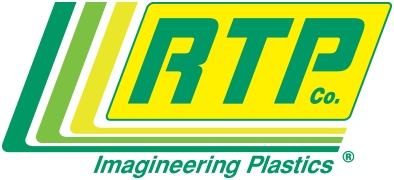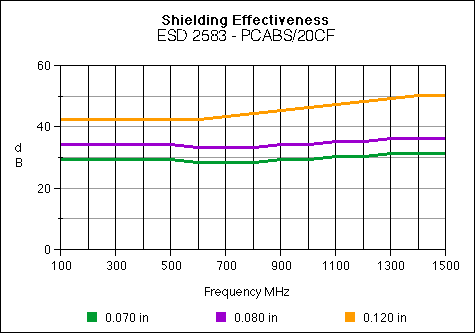Carbon Fiber
- Reinforcing
- Highest strength/modulus properties of the common shielding additives
- Lowest cost of the common shielding additives
- Low shielding performance
ASTM D4935: Standard Test Method for Measuring the Electromagnetic Shielding Effectiveness of Planar Materials
This test method provides a procedure for measuring the electromagnetic (EM) shielding effectiveness (SE) of a material due to a plane-wave, far-field EM wave. The test utilizes a coaxial transmission line to determine the shielding effectiveness of a given material. The test method is valid for a frequency range of 30 MHz to 1.5 GHz. Various thicknesses and types of materials can be tested to acquire a relative ranking of shielding effectiveness.
[note color=”#FFFFCC”]
RTP 2500 Series Polycarbonate/ABS Alloy Compounds
[col type=”lts-one-half”]Advantages
- Processability
- Toughness — even at low temperatures
- Dimensional stability
[/col][col type=”lts-one-half lts-col-last”]Limitations
- Chemical resistance
- Weatherability
- Fatigue endurance
[/col]
PC/ABS alloys process with the ease of ABS (RTP 600 Series) materials yet have a toughness similar to polycarbonate (RTP 300 Series) materials. The high heat distortion of the alloy is an improvement over ABS, while the low temperature impact resistance gives it an advantage over polycarbonate.
By reinforcing the alloy with glass fiber, nickel-coated carbon fiber and/or stainless steel, RTP Company can produce compounds that meet the structural, static dissipative and EMI/RFI shielding requirements of the computer and business machine markets.
RTP Company’s EMI 2580 FR Series PC/ABS compounds incorporate nickel-coated carbon fiber and flame retardant additives. These compounds are UL recognized with a ratings of V-0 @ 1/16 inch (1.6 mm) and 5VA @ 1/8 inch (3.2 mm).
[/note]
No information supplied by RTP Company constitutes a warranty regarding product performance or use. Any information regarding performance or use is only offered as suggestion for investigation for use, based upon RTP Company or other customer experience. RTP Company makes no warranties, expressed or implied, concerning the suitability or fitness of any of its products for any particular purpose. It is the responsibility of the customer to determine that the product is safe, lawful and technically suitable for the intended use. The disclosure of information herein is not a license to operate under, or a recommendation to infringe any patents.





